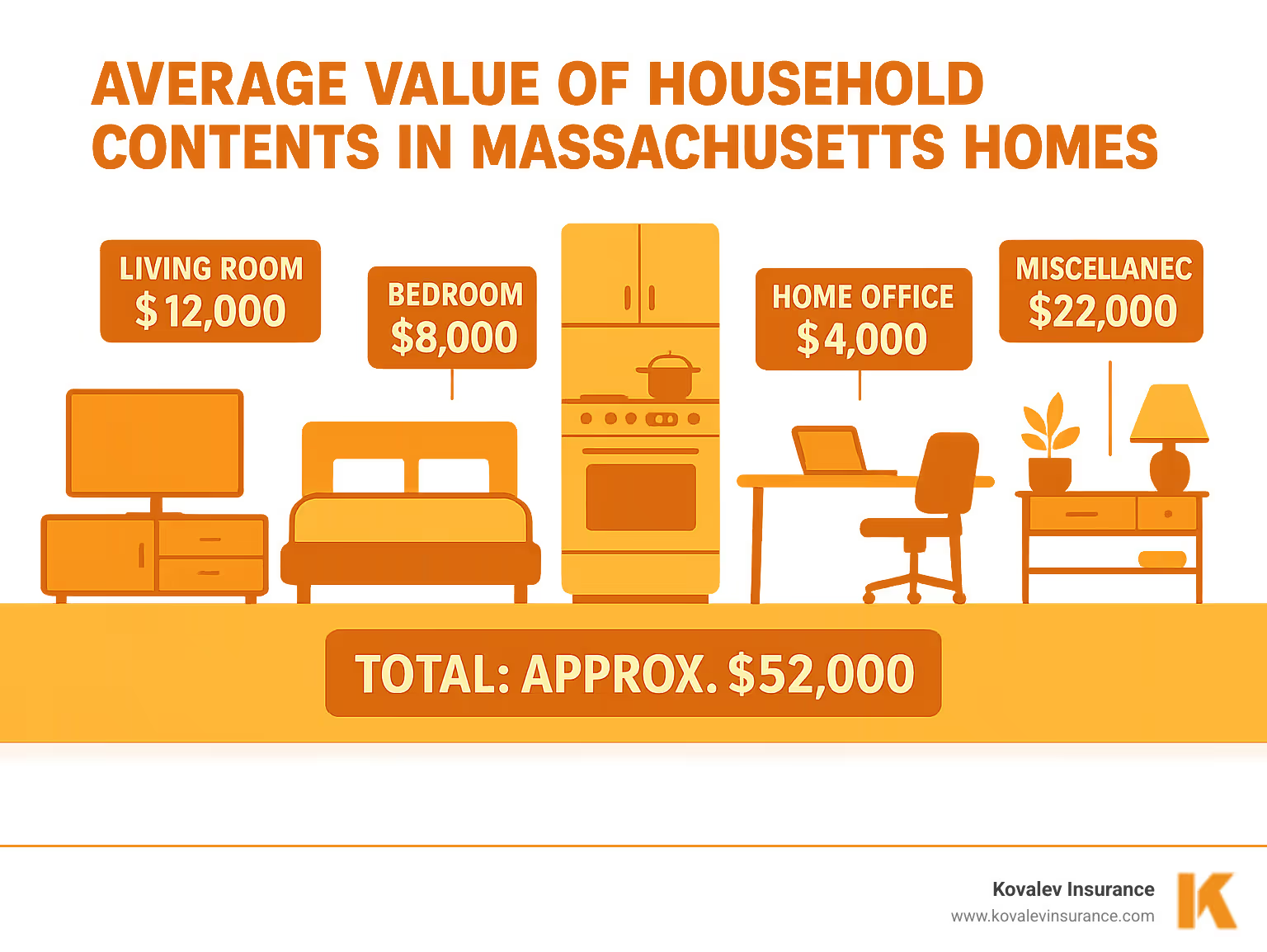Blog Content
29
Aug
2025

Contents insurance protects your personal belongings when life throws you curveballs - from burst pipes in your Newton apartment to break-ins in your Wellesley home.
What Contents Insurance Covers:
Who Needs It:
Most Massachusetts residents seriously underestimate how much their belongings are worth. That laptop, winter coats, kitchen appliances, and furniture add up fast - often totaling $30,000 to $50,000 or more.
The average Bay State home contains almost $52,000 worth of contents, yet many people skip this coverage or buy too little. When disaster strikes, they find the hard way that replacing everything costs way more than expected.

Contents insurance helpful reading:
Picture this: you're standing in your Newton living room, looking around at everything that makes your space uniquely yours. Contents insurance is what protects all of this - basically everything you'd need to pack up if you moved tomorrow.
Your personal belongings are more valuable than you think. We're talking about furniture and appliances, your electronics and gadgets, all your clothing and personal items, plus kitchenware, books, artwork, sports equipment, and tools. It adds up faster than a grocery bill at Whole Foods.
Here's where it gets interesting - contents insurance works differently depending on your living situation in Massachusetts. Renters in Cambridge or Somerville buy standalone tenant insurance, which is mostly contents coverage with some liability protection thrown in. Homeowners get contents coverage bundled right into their home insurance policy. Condo owners in places like Wellesley or Brookline need it to cover their belongings plus any improvements they've made to their unit.
When disaster strikes and you need to file a claim, you'll face a choice that can make or break your financial recovery. Replacement cost coverage pays what it actually costs to buy a new item today - so if your three-year-old laptop gets stolen, you get enough money to walk into Best Buy and replace it with something similar and new.
Actual cash value sounds reasonable until you realize it pays what your item was worth at the time of loss, minus depreciation and wear. That same laptop might only net you enough cash for a refurbished model that's seen better days.
We always steer our Massachusetts clients toward replacement cost coverage. Yes, it costs a bit more upfront, but when you're trying to rebuild your life after a fire or flood, you don't want to find your insurance check won't cover what you actually need to replace.
Scientific research on policy basics backs up what we see every day: most people drastically underestimate both how much their stuff is worth and what it'll cost to replace everything.
This is hands-down the most common confusion we encounter with Massachusetts homeowners, so let's tackle it head-on.
Buildings insurance (sometimes called dwelling coverage) protects the bones of your home - the walls, roof, floors, and built-in fixtures. When that massive oak tree in your Brookline backyard decides to crash through your roof during a nor'easter, buildings insurance steps up to fix the roof and repair any structural damage.
Contents insurance is all about your stuff - everything that would tumble out if someone picked up your house and turned it upside down like a piggy bank. When that same tree crushes your dining room table and destroys your home office setup, that's where contents coverage saves the day.
The easiest way to think about it? If you can pick it up and carry it when you move, it's probably contents. If it's permanently attached to your house and would require tools or construction work to remove, it's likely part of the building structure.
Here's the truth: almost everyone in Massachusetts needs some form of contents insurance, but the type depends on your living situation.
If you're renting in Newton, Wellesley, or anywhere else in the Bay State, your landlord's insurance only protects the building - not your stuff. That laptop, winter coat collection, and kitchen gadgets? They're on you to replace. Even if you think you don't own much, replacing everything from scratch will shock you. Basic tenant insurance starts around $15 per month - probably less than your monthly coffee budget.
First-time homebuyers face a different situation. Your mortgage lender requires buildings insurance, but contents insurance is technically optional. Don't let that fool you into skipping it. We've watched too many new homeowners in Brookline and Needham learn this lesson the hard way when disaster strikes.
College students living in dorms or off-campus housing around greater Boston have some tricky coverage gaps. Your parents' home insurance might extend some protection to your belongings, but there are strict limits and conditions. More info about renter coverage helps you understand what's really covered.
Short-term rental hosts need special attention. If you rent out a room or your entire Belmont home on platforms like Airbnb, standard policies might not cover damage caused by guests. More info about short-term rentals explains the additional protection you'll want.
Running a home-based business creates another coverage challenge. That expensive computer equipment, inventory, or professional tools might not be covered under standard contents insurance. Business property often needs separate coverage to be properly protected.
Real situations we've handled tell the story better than any sales pitch (we've changed names for privacy):
Sarah's basement flood in Belmont happened during a typical spring storm. Water destroyed her finished basement home office, exercise equipment, and boxes of irreplaceable family photos. Her contents insurance paid for new equipment and even helped recover some digital photos through a specialty service. The total claim reached $18,000 - money she never could have scraped together on short notice.
Mike's dorm theft at Boston College seemed like a nightmare before finals week. Someone stole his laptop, expensive textbooks, and winter clothes from his dorm room. His parents' home insurance did cover the theft, but only up to $2,500 - nowhere near enough to replace everything when he needed it most.
Jennifer's kitchen fire in her Natick condo started as a simple grease fire but quickly got out of control. The flames destroyed her appliances and cabinets, while smoke damage ruined clothing throughout the unit. Her condo association's master policy covered the structural repairs, but her contents insurance handled the $25,000 in personal property losses.

Understanding what your contents insurance covers - and what it doesn't - can save you from nasty surprises when you need to file a claim. Think of it this way: most policies protect you from sudden, unexpected disasters, but not from gradual problems or poor maintenance.
The good news first. Contents insurance typically springs into action when fire or lightning strikes your Newton home, when thieves break in and steal your electronics, or when wind and hail damage your belongings during those fierce Massachusetts storms. Water damage from burst pipes or appliance leaks gets coverage too - something we see frequently in older Wellesley and Brookline homes during winter months.
Your policy also covers damage from falling objects (like that tree branch that crashes through your Needham apartment window), problems from the weight of ice or snow on your roof, and electrical surges that fry your expensive gadgets.
Beyond protecting your stuff, contents insurance includes some bonus coverage that many Massachusetts residents don't realize they have. Personal liability protection kicks in if someone gets hurt in your home and decides to sue. Additional living expenses coverage pays for hotel stays and restaurant meals if your Belmont home becomes unlivable after a covered loss. Many policies even provide off-premises coverage - limited protection for belongings stolen from your car or while you're traveling.
Now for the reality check. Contents insurance won't cover floods from outside sources like rivers or storm surge - that requires separate flood insurance that's especially important in low-lying areas near the Charles River. Earthquakes aren't covered either, though you can add this protection in Massachusetts. Normal wear and tear, pest damage, and business property fall outside standard coverage.
Here's a quick comparison to keep things clear:
The pattern here? Contents insurance handles sudden accidents and disasters, but it won't fix problems that develop slowly over time or result from neglect.
Here's where many Massachusetts residents get caught off guard: standard contents insurance policies put caps on certain valuable items. Your jewelry might only be covered up to $1,500 total, cash and coins often max out around $500, and bicycles typically get $1,000 to $1,500 per bike. Art and collectibles frequently face $2,500 limits, while business equipment might be excluded entirely.
Don't panic - you can fix these gaps with smart add-ons. Scheduled personal property coverage lets you list specific high-value items like that engagement ring or expensive road bike with their own separate limits. The best part? No deductible applies to scheduled items when you file a claim.
Given Massachusetts' aging housing stock, we strongly recommend sewer backup coverage for clients in Newton, Wellesley, and surrounding areas. This protects against water damage from backed-up drains or sewers - a problem we see regularly in older neighborhoods with combined sewer systems.
Identity fraud coverage helps cover expenses if someone steals your personal information, including legal fees and lost wages while you sort out the mess. Water backup coverage provides broader protection for water damage from various sources beyond just sewer backups.
For condo owners in Brookline or Natick, loss assessment coverage becomes particularly important. This protects you if your condo association faces a large claim and needs to assess individual unit owners for costs that exceed the master policy limits.
The key is matching your coverage to your actual risks and belongings. We help Massachusetts families steer these choices every day, making sure you're protected without paying for coverage you don't need.

Figuring out how much contents insurance you need isn't rocket science, but it does require some honest soul-searching about what you actually own. Most people in Massachusetts underestimate their belongings by about 30% - which becomes a costly mistake when disaster strikes.
In our experience working with families across Newton, Wellesley, and Brookline, most residents need between $25,000 and $75,000 in coverage. But here's the thing - your specific needs depend entirely on your lifestyle and what you've accumulated over the years.
The most accurate way to determine your coverage needs is creating a home inventory. Start by walking through each room with your smartphone or a notebook. Your living room might contain $8,000 to $15,000 worth of stuff when you add up that big-screen TV, sound system, couch, coffee table, and all those decorations you've collected over time.
Your kitchen is often worth more than people realize. Between major appliances, that fancy coffee maker, quality cookware, dishes, and all those small gadgets tucked in drawers, you're easily looking at $5,000 to $12,000.
Don't forget about bedrooms - furniture, clothing, electronics, and personal items can add up to $6,000 to $10,000 per room. If you have a home office, that computer setup, printer, desk, and supplies might represent another $3,000 to $8,000.
Then there's all the miscellaneous stuff - tools in the garage, sports equipment, seasonal decorations, items in the basement or attic. This category often surprises people with how quickly it reaches $5,000 to $10,000.
More info about MA cost insights shows that Massachusetts residents often need higher coverage limits than the national average, partly due to our higher cost of living.
When structuring your contents insurance policy, you'll face some important choices. Replacement cost coverage costs more upfront but pays what it actually costs to buy new items today. Actual cash value coverage is cheaper but only pays what your used items were worth at the time of loss - often leaving you short when it's time to replace everything.
For high-value items like jewelry, art, or expensive electronics, consider scheduled personal property coverage. This provides broader protection and eliminates your deductible for those specific items.
Here's the streamlined approach we recommend to our Massachusetts clients who want accuracy without spending weeks on paperwork.
Step one involves going room by room with either a smartphone app or old-fashioned pen and paper. List everything you'd need to replace if you were starting from scratch tomorrow.
Step two is where you assign realistic replacement costs. Look up current retail prices online for similar items. You want to know what it costs to replace these things today, not what you paid for them years ago.
Step three brings it all together. Add up all your rooms, then tack on an extra 20% buffer for items you inevitably forgot about. Round up to the nearest $5,000 or $10,000 increment. This method typically gets you within 10-15% of your actual needs.

Let's talk money. Contents insurance in Massachusetts won't break your budget - most families pay between $15-$50 monthly for standalone coverage, or see their home insurance premiums increase by just $100-$400 annually when adding contents protection.
Your ZIP code plays a bigger role than you might expect. Living in Newton or Wellesley typically means lower premiums than downtown Boston, thanks to lower crime rates and better emergency response times.
The amount of coverage you choose obviously affects cost, but here's something interesting - doubling your coverage from $25,000 to $50,000 might only bump your premium up 20-30%.
Your deductible choice is your biggest lever for controlling costs. Jumping from a $250 to $1,000 deductible can slash your premium by 15-25%. Just make sure you can comfortably afford that higher out-of-pocket cost if disaster strikes.
Here's where smart Massachusetts residents save real money: bundling discounts can cut 10-25% off both your contents and auto insurance. I've seen families in Needham and Belmont save $300-$800 annually just by combining their policies.
Security systems aren't just about protection - they're about savings too. Monitored alarms, modern smoke detectors, and water leak sensors can reduce your premiums by 5-15%.
More info about average renter cost breaks down specific Massachusetts pricing if you want to dig deeper into the numbers.
When it comes to filing claims, preparation makes all the difference. The moment something happens, your priority is safety - don't enter damaged areas until you're sure it's secure. Then contact your insurer immediately. Most companies offer 24/7 claim reporting, and the sooner you call, the sooner help arrives.
Documentation is your best friend during claims. Take photos and videos from multiple angles, create written lists of damaged items, and gather any receipts or proof of purchase you can find.
Scientific research on saving tips confirms what we see daily - proper documentation speeds up claims processing by weeks and often results in higher payouts.
Your contents insurance does travel with you, but with some important limits. Most policies cover your belongings away from home up to about 10% of your total contents coverage. So if you have $50,000 in contents coverage, you might have $5,000 protection for items stolen from your Boston hotel or rental car during a vacation.
This basic coverage handles common travel mishaps like theft from hotel rooms or luggage stolen from your car. For serious travelers or those carrying valuable items, an "all-risks" rider provides much broader worldwide coverage.
This question trips up many Massachusetts homeowners, so let's clear it up. Contents insurance isn't separate from homeowners insurance - it's actually built right into your homeowners policy.
Your homeowners policy is like a bundle with different sections: dwelling coverage protects the building structure, contents coverage protects your stuff, plus liability and additional living expenses. Each section has its own separate limit.
Renters and some condo owners buy standalone contents insurance because they don't own the building structure - they only need protection for their personal belongings.
Three simple moves can put real money back in your pocket without sacrificing protection.
Bundling your policies is the easiest win. Combining your contents insurance with auto coverage typically saves 10-25% on both policies. I've helped Natick families save over $500 annually just by bundling.
Raising your deductible from $250 to $1,000 can cut your premium by 15-30%. Yes, you'll pay more out-of-pocket if you file a claim, but for most people, the annual savings outweigh the risk.
Installing protective devices serves double duty - they protect your belongings and earn you discounts. Security systems, updated smoke detectors, and water leak sensors can reduce premiums by 5-20%.
Massachusetts Contents insurance is really about protecting the life you've built - your morning coffee routine with that special mug, your cozy reading corner, the family photos that can't be replaced. It's not just about the dollar value of your stuff, though that matters too.
We've walked through everything from basic coverage to policy details, but here's what it comes down to: most Massachusetts residents need this protection, and it costs far less than you'd expect. Whether you're paying $15 a month for renters coverage or adding $200 annually to your homeowners policy, it's a small price for big peace of mind.

I've been helping Massachusetts families with their insurance needs for over a decade, and the conversations that stick with me aren't about policy details or premium savings. They're about the relief in someone's voice when they realize their claim will cover everything they lost, or the gratitude from a young family who can focus on their kids instead of worrying about replacing everything after a kitchen fire.
At Kovalev Insurance, we know that every family in Newton, Wellesley, Brookline, Needham, Belmont, and Natick has different needs. The college student in a studio apartment needs different coverage than the growing family in a four-bedroom colonial. That's why we take time to understand your specific situation before recommending anything.
Our approach is straightforward: we explain your options in plain English, help you understand what you're buying, and make sure you're getting the best value for your situation. No pressure, no confusing jargon, just honest advice from people who've been doing this long enough to know what works.
More info about custom home insurance coverage shows how we tailor policies to fit real Massachusetts lifestyles.
Ready to get started? Give us a call or stop by for a no-obligation conversation about your coverage needs. We'll review what you have now, talk about what you actually need, and show you options that make sense for your budget and lifestyle.
Because protecting what matters to you shouldn't keep you up at night - it should help you sleep better.
X